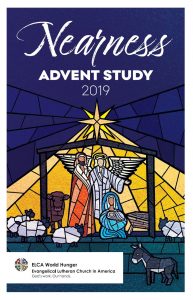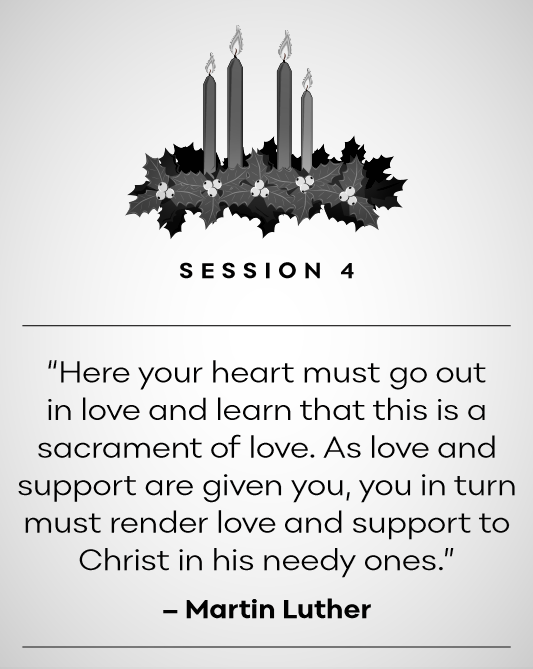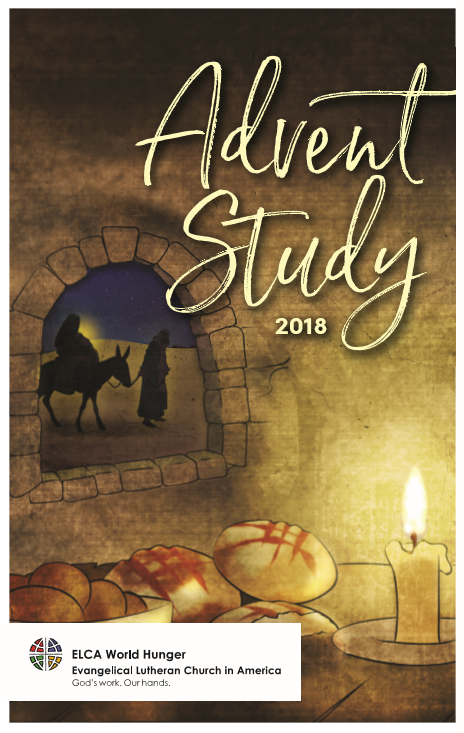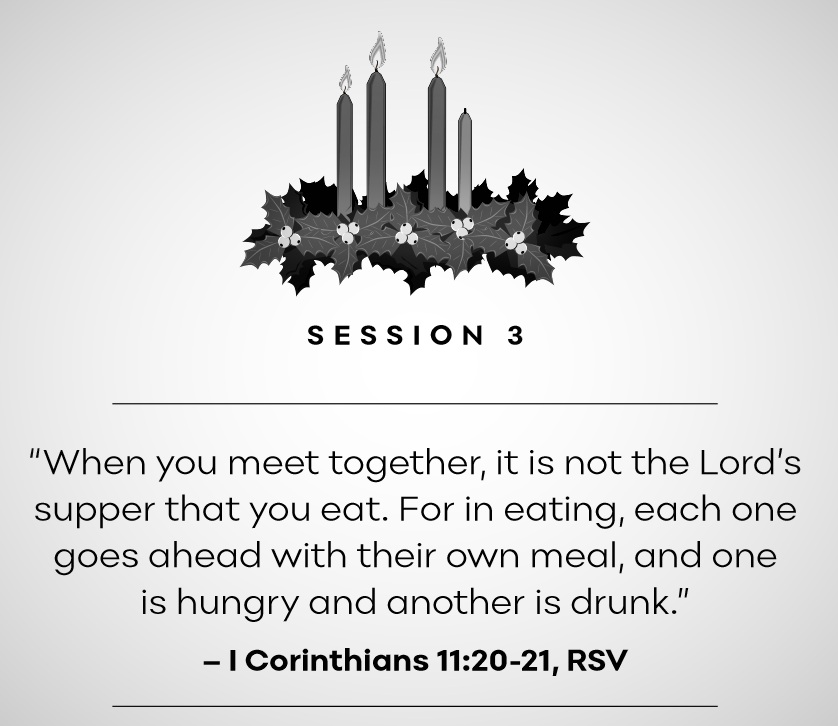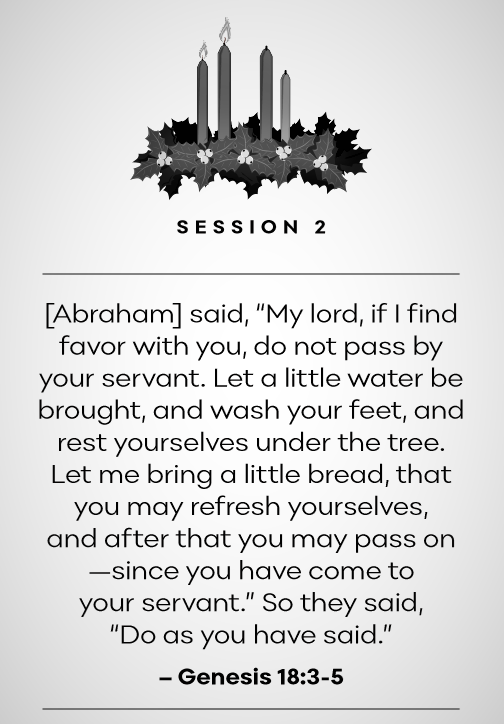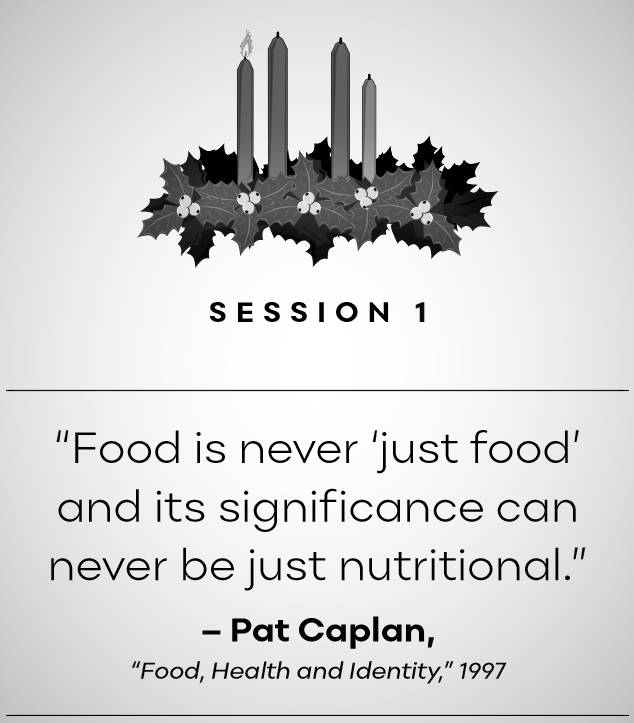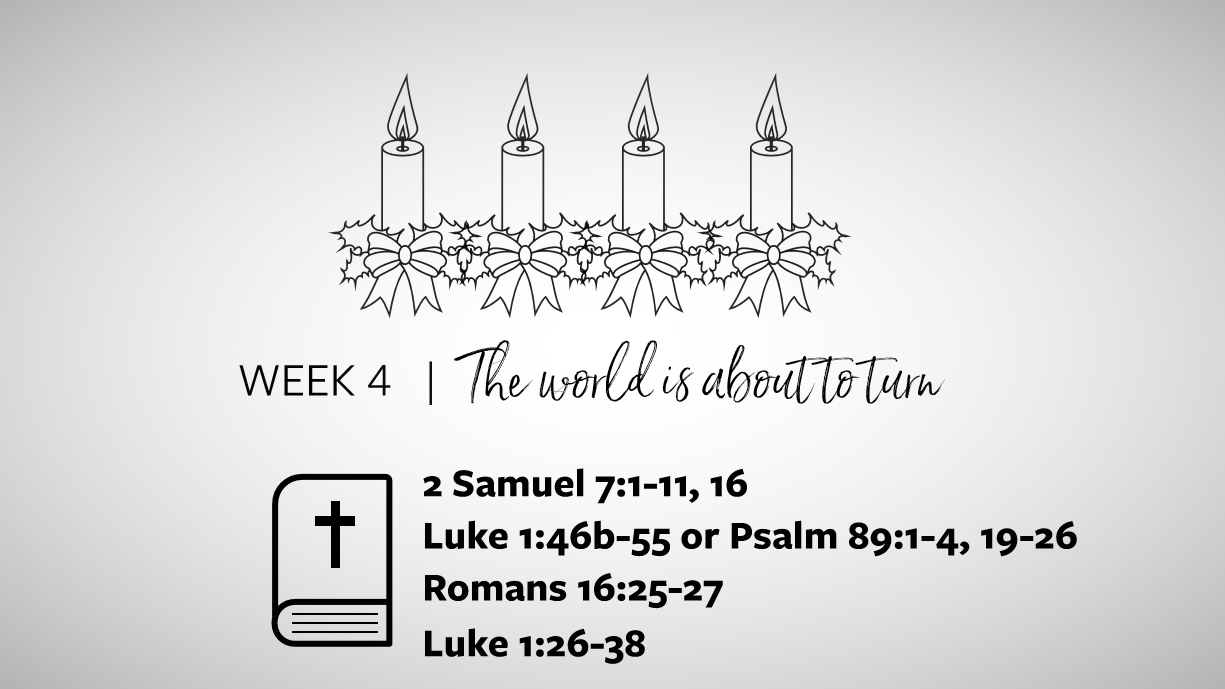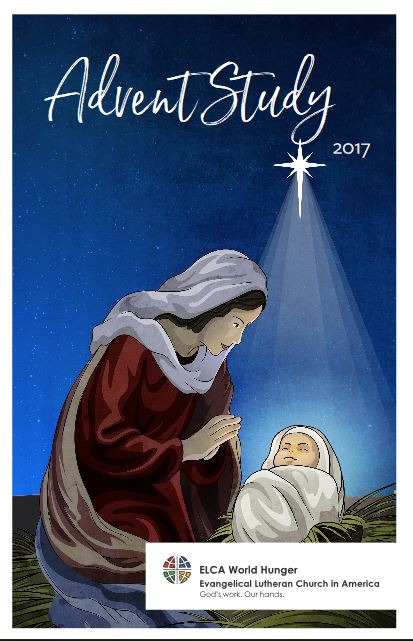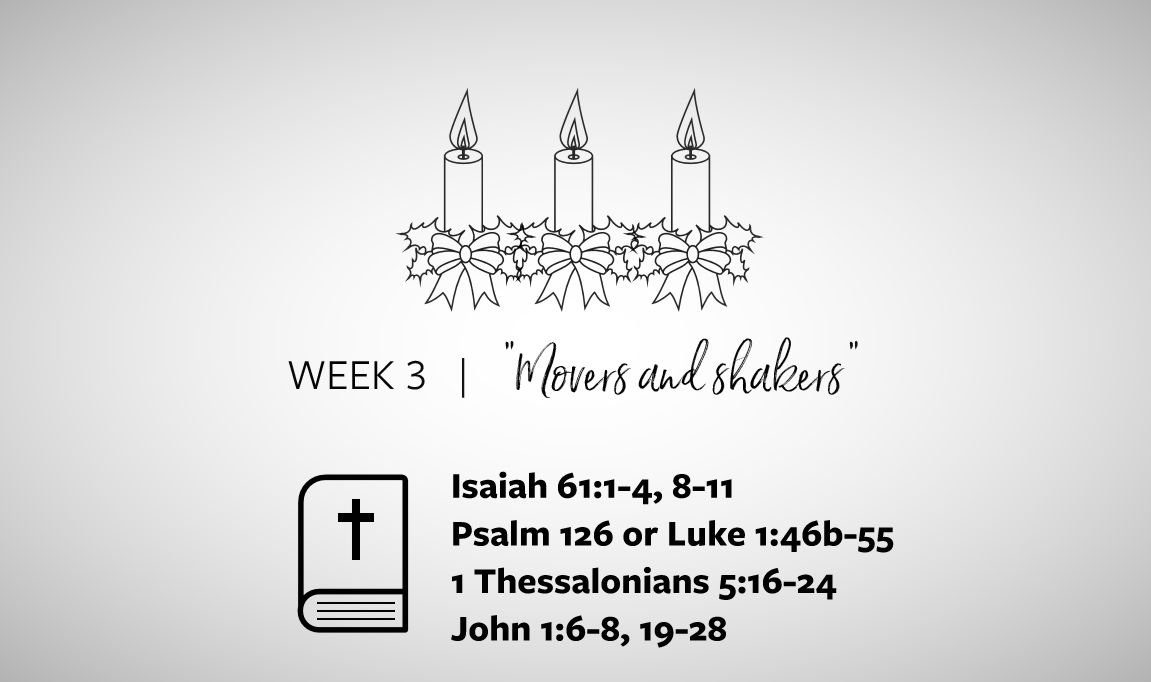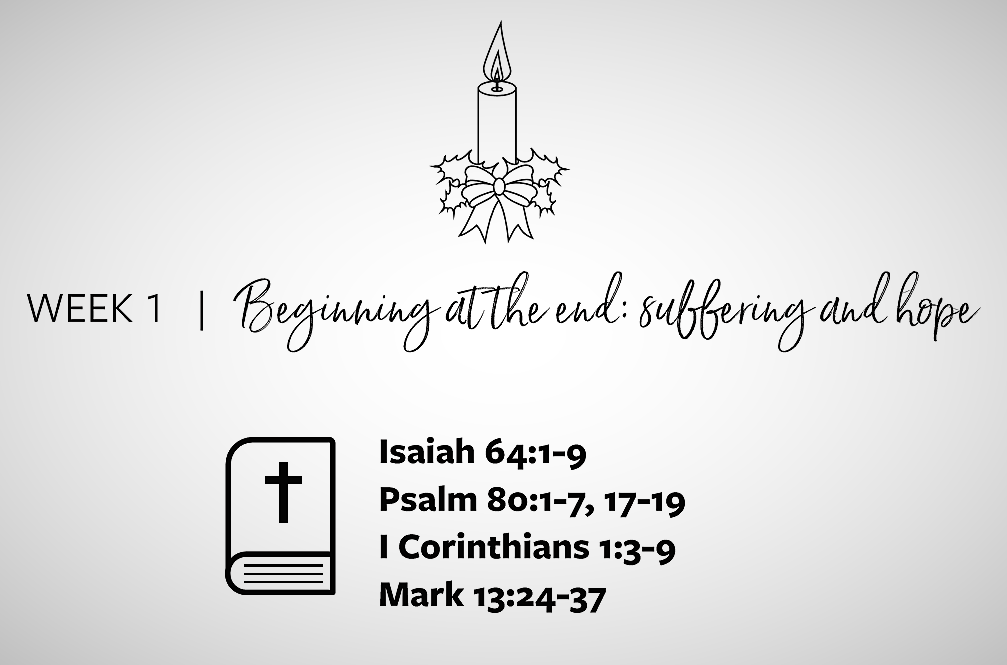This advent reflection is part of ELCA World Hunger’s 2019 Advent Study. You can download the full study here. The children’s messages are a part of ELCA World Hunger’s sermon starter series which is published via email every Monday. You can sign up for the weekly email here on the right side of the page.
Week 1
“Jesus is Coming”
“Therefore you also must be ready, for the Son of Man is coming at an unexpected hour” (Matthew 24:44).
The readings for this Advent, appropriately, are full of expectation. In many households, “expectation” has been the theme since the last few days of November. Some folks are digging out dusty boxes of decorations, young children are making early drafts of Christmas wish lists, and local stores … well, they’ve been ready for Christmas since Halloween ended. The air is full of anticipation. In the midst of this, it can be difficult to wrap our heads around the idea that “the coming of the Lord” was not always a joyous thing to look forward to. Thankfully, roadside billboards across the country are there to
remind us:
- “Jesus is coming! Are you ready?” (against a background of flames);
- “Repent! Jesus is coming to judge YOU!”;
- “I will be back” (with a decidedly angry-looking Jesus on the cross); and
- (the rather specific) “Judgment Day is coming — May 21, 2011.”
The last one may have been a slight miscalculation. But the idea is still there — Jesus is coming, and he’s bringing the thunder (or fire or brimstone or a can of what-have-you). And you thought that sweater from Aunt Myrtle last year was the worst thing anyone could get for Christmas. As striking as these messages might be, they aren’t really that far off from a pretty common thread in Holy Scripture. The arrival of God into the world is a fairly frightening prospect. The “day of the Lord,” as it is sometimes referred to, is described as “great and terrible” by the prophet Joel (2:31).
In Scripture, it seems, the future is something to fear. And certainly, for many people around the world who are uncertain about their health, their job or the environment in which they live, there are some bleak prospects on the horizon. But this isn’t the only way Scripture describes the coming of God. Certainly, as the prophetic writings in the Bible make clear, God drawing near is always risky business. But the story of Christ subverts our expectations — a humble manger instead of a flaming chariot, swaddling clothes instead of royal robes, a carpenter instead of a king.
Jesus’ prophecy in Matthew about the return of the Son to the throne is not a pleasant passage to kick off the Advent season. It is full of dire warnings about the coming days for the people. Jesus admonishes the disciples to watch expectantly for his return, but he also says something about what shape that expectation ought to take. And in doing so, Jesus again challenges assumptions about the end of time.
Jesus makes clear that, first, preparing for the day of the Lord is not about getting ourselves “right with God” so that we might be among the ones taken up rather than left in the field (24:40). By grace, we are saved from dreading the future. In faith, we know that God’s salvation of the world has already begun — and that it includes us. The second thing Jesus teaches is that the day to come should not cloud our vision from the work left yet to do before that day. The parables Jesus tells describe servants at work, doing what they can and laboring now, before the return of the “master.”
Jesus’ teachings in Matthew 24 are part of a larger sermon that includes Matthew 25. It’s in this later chapter that Jesus lays out the labors of the people of God as we await his coming: feeding those who hunger, satisfying those who thirst, showing hospitality to strangers, visiting the imprisoned and caring for those who are sick.
What does expectation of the dreaded “day of the Lord” look like for followers of Jesus? Actively being about the business of caring for our neighbors. Ultimately, the end is not about our repentance, or our righteousness or our own fear of judgment. It is about accompanying one another, caring for one another, and meeting each other’s needs. That is the labor of the expectant servant. For all the talk about the separation between those who will be “taken” and those who will be “left” (24:40-41), Jesus’ warnings about the day of the Lord are not meant to separate us from one another but rather to draw us near to each other in love, hospitality and care.
God has drawn near and commissioned God’s people with a holy vocation: to attend to their neighbors. The future is not something to be feared but something to be embraced. As people of faith, we know that our best days are not behind us but ahead of us. We know that the plans God has for us are, in the words of Jeremiah, “plans for your welfare and not for harm, to give you a future with hope.” We cling to the vision of John, who in Revelation 7 describes the future as a time when all will be sheltered by the one on the throne: “They will hunger no more, and thirst no more; the sun will not strike them … for the Lamb … will be their shepherd … and God will wipe away every tear from their eyes.” We know that we have been set free by grace to reimagine our world, no longer beholden to the past or worrying about the future. We are set free to be the church — to be bold and creative and courageous, knowing that we are part of a story God is enacting in our midst, a story of God at work through God’s people.
Gustin knows this about the future. A farmer and village leader in the Dowa district of Malawi, Gustin was 57 when he started to get sick. The day started like any other, but working in the field, he was overcome with muscle pain. Too weak to walk, he was helped by a fellow community volunteer, who hired a bicycle to bring them to the nearest clinic, 12 miles away. It was there that Gustin learned he was HIV-positive.
For Gustin, the future could have looked bleak, but he was determined to fight, not only for his own sake but for the sake of his neighbors. Through the Evangelical Lutheran Church in Malawi (ELCM), Gustin met with a community health counselor who was trained in an ELCM program supported by ELCA World Hunger. With access to treatment, education and a companion for his long journeys to the clinic or hospital, Gustin got the help he needed. And now, he works in the community, actively counseling others who are living with HIV and AIDS.
Gustin refused to let his diagnosis become a prognosis for his future or the future of his community. With the right support, his diagnosis does not stop him from working toward a brighter tomorrow for his neighbors. “I know that my life is not over,” he says, “and I have a future.” God draws near, and the “day is coming.” But for people of faith, the future is filled with hopeful expectation, and the present is filled with active, loving service that draws us to one another
Reflection Questions
- How does your congregation inspire hope for the future in you, your family or your community?
- In what ways is your church part of building a brighter future within your community?
- How can the church counter the messages of fear within our communities today?
Children’s Message
Brooke De Jong is the writer of this Advent children’s message. Brooke is the Program Assistant for Hunger Education with ELCA World Hunger and a youth director in Park Ridge, Ill. This Advent Children’s Message is cross-posted from ELCA World Hunger Sermon Starters.
Set up:
The season’s texts provide the leader with an opportunity to practice Advent anticipation and grow that anticipation with each children’s message until Christmas Eve/Christmas Day.
Bring in a large wrapped box. Inside the box make sure to include three smaller boxes, one inside the other, like nesting dolls.
Inside the smallest box put a pocket mirror. Draw a large yellow star on the outside of this smallest box. Inside the second-largest box put the smallest box along with a bunch of new Band-Aids and draw a large red cross on it like an emergency first aid kit. And inside the next largest box, put the other boxes along with a bunch of stickers. On the outside of this larger box, put a picture of a stump with a stem springing forth. On the tree, you’ll write the riddle posted next week. For the largest box, wrap it in blue paper and/or add a blue ribbon to it to make it look like a present that is the color of your advent paraments. Inside the box place a packing list and an image of a hard hat for each child.
Script:
Invite the children to come forward.
Good morning everyone! I invite you to look around and tell me if you notice anything different at church this morning. (wait for response)
We changed colors today and added a few things! This is because we are starting a new year at church! The church year does not start on January 1st but with the season of Advent. (take a minute to point out the new color and explain any new objects, such as an advent wreath).
We also have this new big present! Would you like to see what is inside? (let the children help you unwrap the box). Hmmmm . . . there is another box and some other items. We will have to wait until next week to see what is inside this box. So, I wonder what these items could be for? (show everyone the items in the box)
(take out packing list) The first thing we have is this piece of paper with a list on it. Would anyone like to read it? (if the children are shy or not of reading age, read the list out loud to the group). It’s a packing list!
I think I have an idea about what the things in our box are about! packing lists are ways we prepare for big, new and exciting adventures.
Did anyone travel for thanksgiving? Is anyone planning to travel for Christmas? (wait for responses) What did you bring with you or what are you planning to bring with you? (wait for responses)
Well, just like we prepare for a trip, we need to prepare for the baby Jesus and the coming reign of God. Advent is a time when we prepare and slow down so we don’t miss the wonderful things God is doing and where God is calling us. But unlike a trip where we rest and relax, in advent, we are called to get to work! I think that is why we have these images of hard hats!
In our story for today, we learn that preparing for the baby Jesus means doing the work of loving and serving our neighbors. Preparing for the baby Jesus is about doing the work of things like showing hospitality to strangers, visiting the imprisoned and caring for those who are sick. What is something that you can do to be welcoming, helpful or show God’s love this advent? (wait for responses).
You all have some unique gifts and unique work to do this advent! Now I invite you to take this hard hat and give it to one of the adults and remind them that they also have some work to do this Advent to welcome the baby Jesus. Ready! Go!

